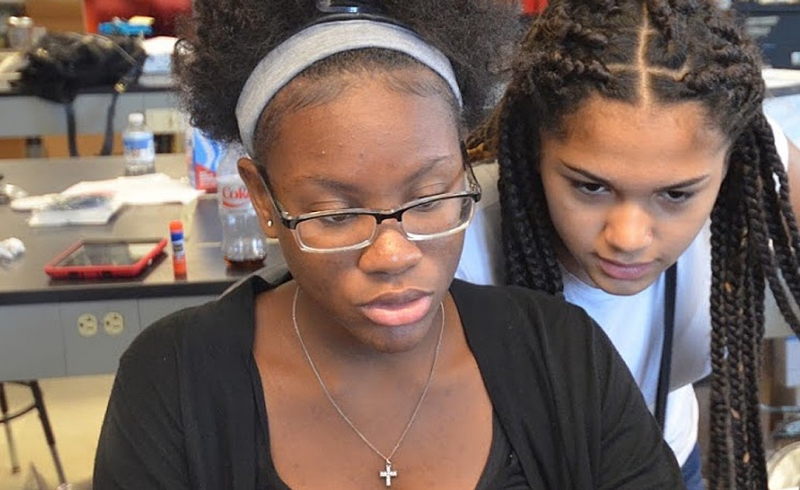Shantao Cao, a visiting student from Jinling High School in Nanjing, China, and Ildo Depina, an eighth grader at the Lilla G. Frederick Pilot Middle School in Dorchester, work on a solar panel to power their hydroponic basil garden at BC's two-week summer STEM workshop. (Ed Hayward)
High school students from China joined peers from Boston schools for a two-week STEM workshop on the BC campus, the first international partnership for the Lynch School of Education’s College Bound program.
Supported in part by funding from the National Science Foundation, the academic program used team projects to teach students about robotics, solar power, coding and hydroponic gardening, according to Professor of Education Mike Barnett, who led the workshop.
The collaboration grew out of Barnett’s work with the College Bound, a year-round pre-collegiate program for Boston Public Schools students, and the recent STEM education partnerships he has launched with several Chinese schools.
“It was a unique opportunity to emulate how the real world works to prepare students for college and the workforce,” said Barnett, a co-principal investigator on an STEM workforce-focused NSF grant that supports the summer program for College Bound students. “Today, you no longer study or work with people who are only from your country. You’re as likely to work with someone from the other side of the globe.”
Barnett is leading the introduction of STEM instructional methods he’s developed to Chinese high school teachers, making him the first American university researcher invited to work with the country’s K-12 curriculum.
Barnett, who leads the Innovations in Urban Science Education Lab at BC, is also developing programs with three elite Chinese high schools, including Nanjing’s Jinling High School, which the visiting students attend.
Jinling and the other schools, which enroll nearly 20,000 students combined, will serve as the initial introduction sites for Barnett’s STEM curriculum, which is used in 500 schools in Massachusetts, Rhode Island, Ohio and California. The Chinese schools, which send many graduates to elite Chinese and U.S. universities, will serve as models for other schools in the country.

Lynn Sejour, a sophomore at the West Roxbury Education Complex and Yaderiz Mendez, an eighth grader at the James A. Hennigan K-8 School in Jamaica Plain, prepare a presentation for a project they completed during a two-week summer STEM workshop on campus. (Ed Hayward)
The group of 12 Chinese students and two teacher chaperones spent two weeks working with 44 College Bound students from middle and high schools in Boston. The visit was coordinated by the U.S.-based non-profit TIE Foundation and students’ families covered their program and travel costs, Barnett said.
Part of the challenge of the workshop was creating a program that would serve Chinese students, who are among their nation’s elite, and Boston Public Schools’ students recruited into College Bound to raise their performance from average to college-focused, said Barnett.
Students were assigned to a “company,” a group that included teams responsible for tasks focused on solar energy, hydroponics and robotics and coding. Each company had to develop and assemble a solar-powered hydroponic system that could be electronically monitored.
“We set up the program to get Chinese kids to interact with College Bound kids by setting them up in groups and teams that required them to collaborate,” said Barnett. “They worked in teams with students with different skill sets in an effort to simulate the college or work environment.”
In addition to science courses and cultural visits, the students met with Boston College faculty including co-principal investigator and Carroll School Lecturer Laura Foote, Associate Professor of Earth and Environmental Sciences Alan Kafka and Associate Professor Ken Burch and Assistant Professor Ilija Zeljkovic, both of the Physics Department.
“These Chinese students come from a school that prepares its students to study at many of the top universities in America,” said Barnett. “So we wanted to give students as much exposure to an American university as possible.”
Shantao Cao, a visiting student from Jinling High School, hopes to attend an American university.
“I have liked all of this – the university, the teachers and the students,” said Cao. “I liked the environment – the nice weather and the clean air. It has been a lot of fun.”
As the program drew to a close, he and fellow team members Ildo Depina, Mariah Wharwood and Amari Mathieu, all of Boston, labored in the hot sun outside Higgins Hall as they troubleshot their solar power station and the hydroponic gardening plot planted with basil.
The Boston students gave their teammate an American nickname of “Jared,” said Depina, an eighth grader at the Lilla G. Frederick Pilot Middle School in Dorchester.
“He’s a really nice guy,” Depina added. “It’s been cool working with Jared and the students from China. It’s been fun meeting new friends.”
Wharwood, who also attends the Frederick, said the experience has only deepened her interest in visiting China.
“It’s been fun for me,” said Wharwood, an eighth grader. “My best friend and I are thinking of going to China when we are in 10th or 11th grade.”
—Ed Hayward | News & Public Affairs




